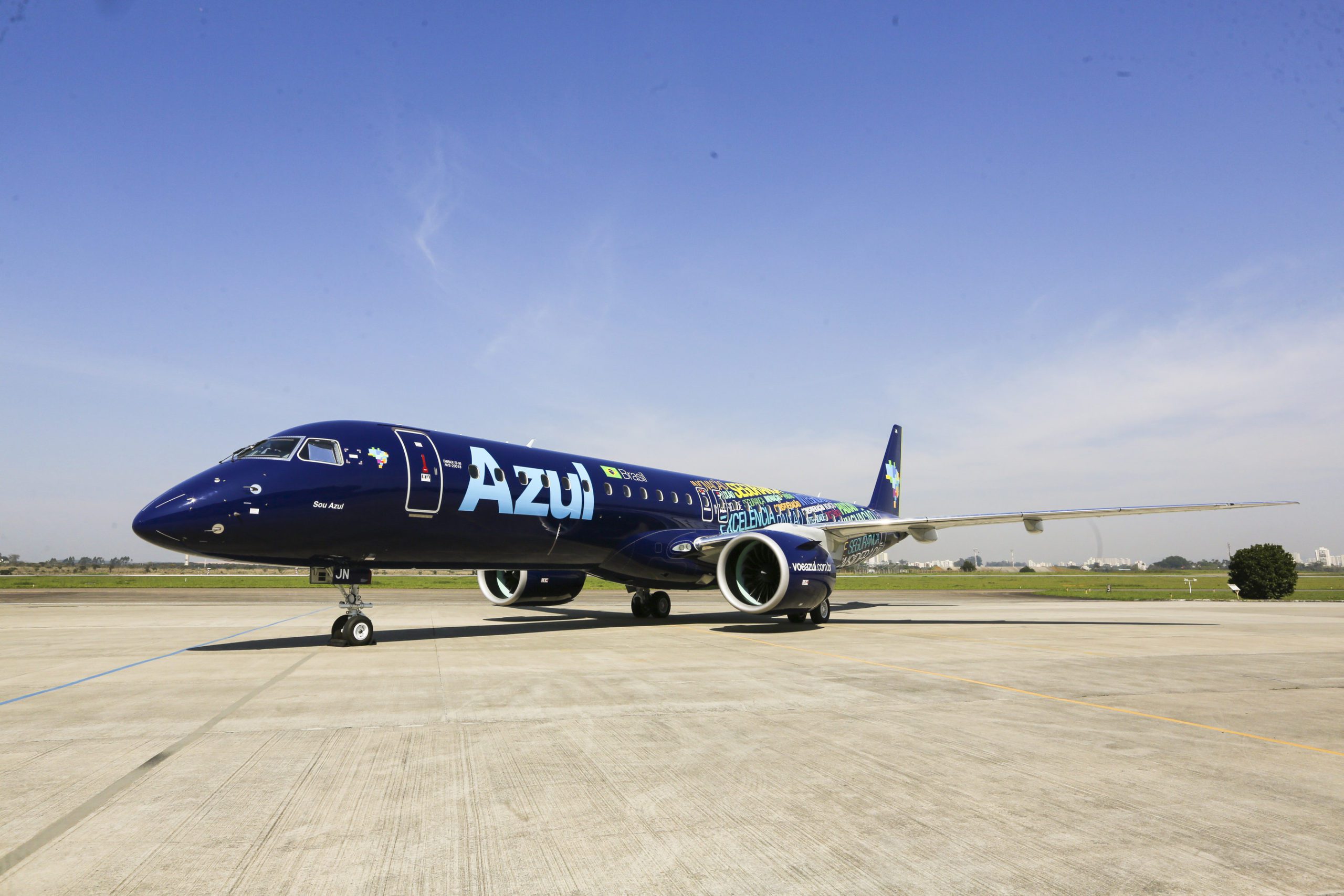
EmbraerE195E2 Azul scaled
Brazilian low-cost airline Azul has reached agreements with airframers and lessors about the deferral of aircraft deliveries and payments for leased aircraft. This will provide Azul with a working capital relief of R$3.2 billion until December 2021, it said during its Q2/HY1 results presentation on August 13.
Azul says it has renegotiated deliveries for 82 aircraft with Embraer and Airbus from the original schedule of 2020-2023 to beyond 24. This includes the 59 E195-E2s of which deferrals were announced already on May 14. Forty were originally expected to join until the end of 2023. Currently, Azul has five of the biggest E2s leased from AerCap.
The remaining 23 aircraft that have been deferred are Airbus A320neo and A321neo’s. Azul already operates forty A320neo’s, all of them leased from Avolon, BOC, AerCap, GECAS, or Jackson Square, plus two A321neo’s through CDB and GECAS. This year, it has taken delivery of three neo’s out of fourteen originally planned. Until 2023, Azul had originally planned to take delivery of 42 neo’s.
Lease obligations reduced by 77 percent
Azul has based its agreement with lessors on revised payment schedules on a conservative recovery scenario as Latin America struggles with low demand due to the many cases of Covid-19. Azul will reduce its payment obligations from April to December by R$566 million or 77 percent, but it will have to pay slightly higher rates from 2023 again or extend contracts based on market rates.
In total, Azul’s lease liabilities until December will be R$3.4 billion or 21 percent lower to R$12.5 billion compared to the original schedule. Of the airline’s total debt position, 80 percent is with lessors.
Azul operates a fleet of 138 aircraft. It has sold twelve Embraer E195s to Azul-founder David Neeleman’s new US low-cost airline Breeze. The first two will join this year and the remaining aircraft until the end of 2021. A Letter of Intent with Breeze includes 28 aircraft to be transferred. In 2019, Azul said it would phase out all 53 E195 on which it has taken a R$16 million impairment. Fifteen aircraft have been sub-leased to TAP Portugal, in which it held a 6 percent indirect share until selling it last July.
Azul recorded a R$-2.936 billion net loss in Q2 on a R$-820 million operating loss and revenues of R$401.6 million. For HY1, net loss was R$-9.072 billion, the operating loss R$-646.7 million on revenues of R$3.204 billion. Cargo revenues were lower in Q2 but 12.9 percent higher for HY1 to R$268.3 million. It modified some of its aircraft for cargo-only operations.
Brazil’s air travel demand contracted by 85 percent, while the Real depreciated by 38 percent, both contributing to the worst quarter in Azul’s history.
In its management plan, the airline has secured R$7.0 billion in cost savings until December 21. In addition to savings on aircraft leases, it expects to save forty percent in salary costs in HY2 as it has placed 10.500 staff on voluntary programs and renegotiated contracts with unions. An unconfirmed number of employees will leave the airline through involuntary furlough. Azul has reduced its workforce since June last year by 29 percent to some 8.600. Managers have seen a 25 pay cut in Q2, with salaries of executives reduced by 50 to even 100 percent.
Daily cash burn is expected to remain at R$3 million for the rest of this year. Postponement and extension of payment terms should improve the liquidity position, which was slightly down to R$3.0 billion by the end of June. Net cash including receivables was R$2.3 billion. Total debt decreased to R$18.9 billion, with an agreement in place to roll over amortization beyond 2021.
Azul expects to operate at 32 percent capacity in August, 43 percent in September, and at 60 percent in December but this is conditional on how Covid-19 will develop in the region. This also affects the codeshare with LATAM Brazil which was announced only last June that will offer travelers complementary route networks. Prior to the crisis, both airlines served 137 destinations in Brazil with 298 routes.
Views: 1



